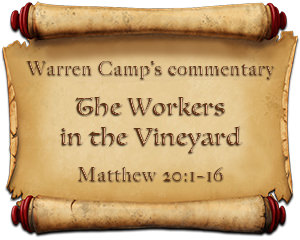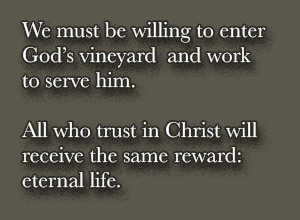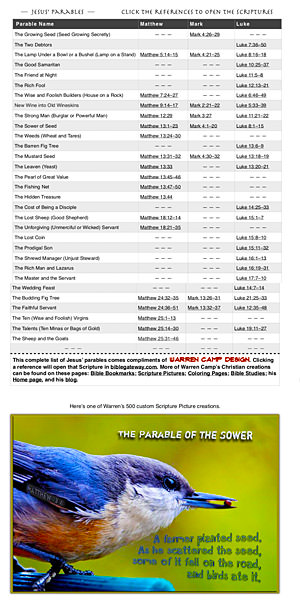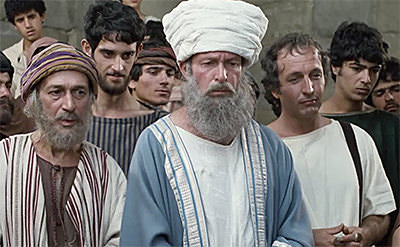Found only in Matthew’s gospel, Jesus’ lengthy parable tells of the workers in the vineyard as an explanation to his comment about “the first being last and the last being first.”
Jesus says that any “laborer” who accepts the invitation to the work in the vineyard (said by Jesus to represent the Kingdom of Heaven), no matter how late in the day, will receive a reward that’s equal with those who’ve been faithfully serving the longest.
— Preview —



Click the list or the “bird” to enlarge and use Warren’s list of forty-four of Jesus’ parables (a PDF file with links to Scriptures).
par•a•ble [noun] a simple story used to illustrate the meaning of or a moral or spiritual lesson, as told by Jesus in the gospels
synonyms: allegory, moral story/tale, fable
Jesus’ Parable of the Workers in the Vineyard
Matthew 20:1–16
While this parable highlights the values of the kingdom of heaven, it reveals the more critical elements of who can be saved and what their reward will be in their receipt of God’s gift of salvation. Among the 44 or so parables of Jesus (see Warren’s complete list) that are recorded in the three synoptic gospels, there are a good number that are particularly well known because they deal with salvation.
To fully appreciate the meaning and importance of this parable, it’s essential that we understand the context in which Jesus presented it and to whom it was directed. Jesus was alone with his disciples when he told them his Parable of the Workers in the Vineyard (also called the Parable of the Laborers in the Vineyard or the Parable of the Generous Employer). We see, as Matthew 19 closes, that Jesus was explaining what he’d said in his previous account of a rich man asking Jesus what he needed to do to enter the kingdom of God (19:16–30), in which is found his explanation of the comment he made (19:30) about "the first will be last and the last will be first." In that account, Jesus responded to Peter’s question (19:27): “We have left everything to follow you! What then will there be for us?” Peter was interested in learning from Jesus what reward would be given to those who’d give up everything to follow Jesus. Matthew starts chapter 20 by telling his readers Jesus’ response to Peter’s “reward” question.
Jesus often used parables to reveal what the kingdom of heaven is like, as shown in my first fifteen parable commentaries. In each, he portrays how one enters the kingdom and who a variety of different characters therein might be. In this Parable of the Workers in the Vineyard, there are things that he told his disciples then, and tells us today, about God’s grace and salvation gift, and that he’s always more than fair in his decisions and actions.
In addition to this agriculture parable, Jesus presented four other well-known parables about seeds and trees: Parable of the Seed, Soil, and Sower, the Parable of the Growing Seed, the Parable of the Budding Fig Tree, and the Parable of the Barren Fig Tree.
The Parable of the Workers in the Vineyard
A Parable of Salvation
This video is recited by Max McLean.
This parable stresses “God’s unmerited grace,” as opposed to “earning God’s favor.” To fully appreciate the essence of this salvation-specific parable, let’s put a few things into perspective before we review the text.
Wages The unit of currency used to pay the workers was a denarius, which amounted to a full day’s wage. A denarius was also a Roman soldier’s pay for a full day, which was generous.
Time of Day The hours that are referenced start at about 6:00 a.m., making the eleventh hour to arrive between about 4:00 and 5:00 p.m.
Job Description Planting, maintaining, and harvesting vineyards in first-century Israel was strenuous work that required hard physical labor during the heat of summer.
Work Force The workers in this parable were poor men who often worked as temporary farmhands during the harvest season; the employer knew that every one of his laborers would need a full day’s pay to feed their families.
Payment Time Day laborers were typically paid in the evening of each day’s labor, following Old Testament guidelines (see Deuteronomy 24:14–15).
Let’s look closely at this parable to see what we can learn about God’s kingdom work, who he asks to become his workers, and what everyone’s reward will be at the end of the job, the day, and the life.
The Parable of the Workers in the Vineyard
20 “For the kingdom of heaven is like a landowner who went out early in the morning to hire workers for his vineyard. 2He agreed to pay them a denarius for the day and sent them into his vineyard” (20:1–2).
The workday in Jesus’ time began early, perhaps at sunrise. As the day progressed and more workers were hired, the specific wage wasn’t mentioned, however, the landowner promised to pay “whatever is right.” Seemingly, the workers were sufficiently confident of the landowner’s character and they trusted him at his word. In the end, five groups of workers were hired at different times of the workday (6 a.m., 9 a.m., noon, 3 p.m., and 5 p.m.); the last group of workers had been hired only one hour before the end of the day.
Those who wanted to work for wages gathered in a usual spot where a landowner, master of the house, and vineyard manager arrived and offered laborers a day of work. Being a useful employee sometimes defined a person. It often amounted to more than obtaining a means to pay monthly expenses. Employment also gave workers dignity and a sense of meaning to their lives. When people couldn’t find work for extended periods, their sense of identity and self-worth would likely begin to erode.
Jesus appears herein to suggest that God is the parable’s master of the house, landowner, or vineyard manager. The workers or laborers are those who’ve been called by God to serve him in one capacity or another. Similarly, Jesus uses this symbolism of “believers being used by God to labor for him” elsewhere in Matthew’s gospel where Jesus said, “The harvest is plentiful but the laborers are few. Ask the Lord of the harvest, therefore, to send out workers into his harvest field” (9:37–38). We’ll now see how this parable will play out.
3“About nine in the morning he went out and saw others standing in the marketplace doing nothing. 4He told them, ‘You also go and work in my vineyard, and I will pay you whatever is right.’ 5So they went” (vv. 3–5).
In this parable, Christ is describing the work of a wealthy man of means who employs people, paying them fair wages. For each worker, a set wage (one denarius; a day’s pay) was offered and accepted, at which point, the workers entered the workplace, which was the vineyard, typically at or around 6:00 a.m. However, the parable tells us that the landowner went out again around 9:00 a.m. and saw other workers standing in the marketplace doing nothing. So he said to them, “You also go work in my vineyard, and I will pay you whatever is right” (v. 7). They accepted his invitation.
We’re told in vv. 5–7 that the landowner returned to the marketplace around noon, then again at 3:00 p.m., finding workers who were standing around because no one had yet hired them. He hired them and they went to his vineyard to work for him. Yet again, the landowner went out to the marketplace around 5:00 p.m. and found more unemployed workers standing there, so he employed them, even at that late-afternoon hour. Starting in v. 8, the plot develops dramatically at evening time when each worker is to be paid for his workday effort.
9“The workers who were hired about five in the afternoon came and each received a denarius. 10So when those came who were hired first, they expected to receive more. But each one of them also received a denarius. 11“When they received it, they began to grumble against the landowner. 12‘These who were hired last worked only one hour,’ they said, ‘and you have made them equal to us who have borne the burden of the work and the heat of the day’” (vv. 9–12).
At the end of the day, the landowner told his foreman: “Call the workers and pay them their wages, beginning with the last ones hired and going on to the first” (v. 8). Those hired at 5:00 p.m. were given a full day’s wage, even though they worked for an hour or so.
Similarly, those workers who were hired at 3:00 p.m., noon, and 9:00 a.m. were all given the full day’s wage, despite the fact that none of them worked the entire day. Finally, those hired at the beginning of the day — at 6:00 a.m. — were also given a daily wage, which was the exact amount that they had agreed to when they were hired.
Those workers who worked the entire day became upset. They thought they should have received more pay than the agreed-on denarius, since those workers who hadn’t worked the whole day still received the full-day’s payment. They complained: “These who were hired last worked only one hour,” then added, “and you have made them equal to us who have borne the burden of the work and the heat of the day.” Their anger against the landowner spilled forth when they realized that they’d all be paid the same, which was the exact agreed-upon wage. The landowner was forced to defend his actions to the first group, even though he’d dealt with them fairly, according to the terms of their individual contract.
In response to their complaint, the landowner replied to one of them, though it was meant for all: “I am not being unfair to you, friend. Didn’t you agree to work for a denarius? Take your pay and go. I want to give the one who was hired last the same as I gave you. Don’t I have the right to do what I want with my own money? Or are you envious because I am generous?” (vv. 13–15). Jesus then concluded by saying, “So the last will be first, and the first will be last.”
The daily wage that Jesus speaks of is eternal life, offered through his sacrifice. The landowner’s decision to pay every worker the same amount was an act of mercy, not injustice. It’s representative of our God, whose grace and mercy are shed abundantly upon those of his choosing. It’s not a matter of man’s desires or efforts, but of God’s mercy. Regarding the concept and gift of salvation, the Lord’s grace and mercy are given to those whose self-righteous works could never obtain it. Every one of us is sinful; we “fall short of the glory of God” (Romans 3:23), but his grace is sufficient to redeem every one of us who believes in him and chooses him to become our Lord.
Whether God calls someone early or late in life to partake of his grace, the glory and praise for our salvation is his alone; fairness and unfairness aren’t deciding factors. Just as the landowner had a right to do what he wished with his money, so does God have the right to be merciful to whomever he choses.
When we put this parable into context, we’re to realize that the first group of workers in the vineyard resented receiving the same wage as the last group. Their attitude was similar to that of the Pharisees, who were incensed at Jesus’ teaching that others, albeit the last group of workers who were likened to non-Jewish Gentiles, could inherit a heavenly kingdom the Pharisees thought was reserved for them alone. They despised Jesus for offering the kingdom to poor, oppressed, weak sinners whom he’d made equal to them.
Notice that all who were paid a wage received their wage at the end of the day. In other words, they had to endure up until the end, remaining on the job until the day was done. The work of planting, growing, and harvesting is continual, needing to be undertaken until the job is complete. Only then, in the Lord’s vineyard or kingdom, is the wage paid.
Note, too, that we must be willing to enter God’s vineyard and work to serve him. We must make ourselves available for God (the landowner) so he can find us after calling us to him. We have to want to work. And we have to endure to the end of the workday, however long that might last for each of us. God’s calling us into his kingdom gives us the highest and noblest opportunity in life. So long as we don’t quit or lose heart or say no to his invitation, we’ll receive the promised reward: God’s gift of his crown of righteousness.
Finally, what do you make of the closing verse?
“So the last will be first, and the first will be last” (v. 16).
The text of v. 16 could very well be the main point of Jesus’ parable. His declaration and the parable itself indicate this: Those who become saved last (whether it’ll be late in their life or late in the history of the world) will receive the same reward as those who were saved earlier.
When we look back to Jesus’ comment that he made immediately before telling this Parable of the Workers in the Vineyard, Jesus said, “Truly I tell you, it is hard for someone who is rich to enter the kingdom of heaven” (19:23). In today’s parable, Jesus attempted to illustrate what would be received by those who’ve chosen to prioritize and follow Jesus before entering his kingdom. Therefore, only those who put God above everything else and become his workers will receive the payment, gift, or reward of eternal life. As Jesus says, “Whoever does not take up their cross and follow me is not worthy of me” (Matthew 10:38).
Verse 16’s “the last will be first, and the first will be last” is meant to advise us that no matter how long or how hard a believer works during his or her lifetime, the reward of eternal life, given to all who become children of God, will be the same: an eternity of bliss in heaven in the presence of God the Father and the Lord Jesus Christ. Remember the thief on the cross (Luke 23:39–43); his life of service was limited to a nanosecond of repentance and confession of faith in Christ; he’ll receive the same ultimate reward of eternal life as those who’ve labored for the Lord most of their lives. This doesn’t mean that they’ll receive the same personal rewards of others when they enter the kingdom, since some will be given more responsibility and authority than others. Nevertheless, all who trust in Christ will receive the same reward: eternal life. How great and generous is our Lord!
“He said to them, ‘You also, go work in my vineyard’” (Matt. 20:7).


